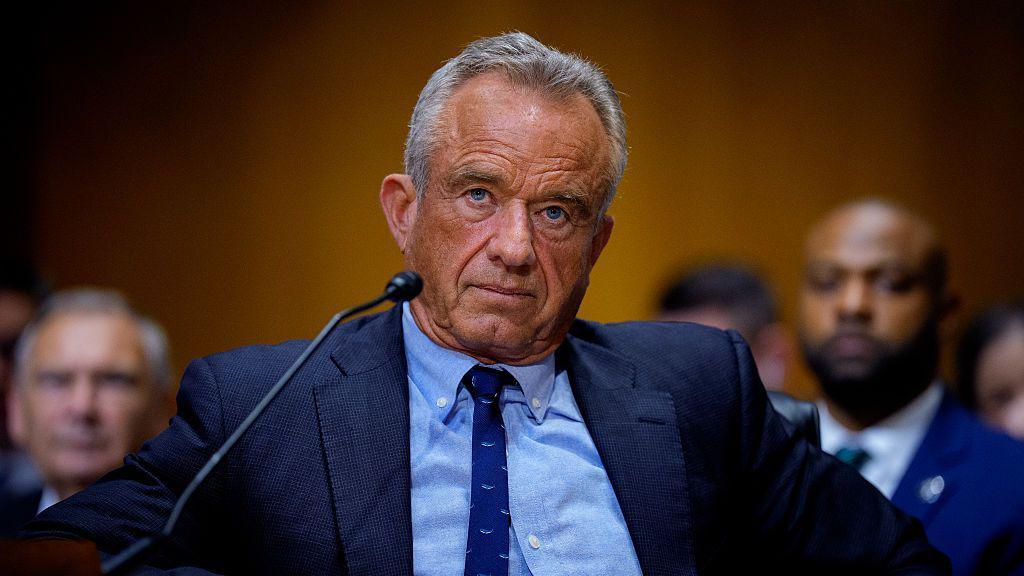Former CDC head says she was fired for refusing Kennedy's vaccine changes
Watch: Fired CDC boss details why she believes she was sacked
- Published
The former head of the US Centers for Disease Control and Prevention (CDC) said she was fired last month for refusing to sign off on changes to vaccine policy "regardless of the scientific evidence."
Dr Susan Monarez also told a Senate committee on Wednesday she was sacked for refusing a request from Health Secretary Robert F Kennedy Jr to dismiss CDC vaccine experts "without cause."
"He said if I was unwilling to do both, I should resign," she said.
Kennedy fired Dr Monarez less than a month after she was sworn in as head of the agency that leads the US response to infectious and chronic diseases, adding to a heated political fight over the changes he has made to his department this year.
Testifying alongside the former chief medical officer for the agency, who resigned after the firing, Dr Monarez told the health committee she had a meeting with Kennedy on 25 August, where he "demanded" two things from her.
The first was that she approve every recommendation from the Advisory Committee on Immunization Practices. Kennedy had dismissed the committee's full membership in June, and has appointed all of its new members
The second, Dr Monarez said, was "to dismiss career officials responsible for vaccine policy, without cause."
When she refused to resign, Kennedy said he had already spoken to the White House about having her removed, she said, adding he informed her he was in frequent communication with President Donald Trump about changes to US vaccine policy.
Kennedy, a notable vaccine sceptic, has previously denied that she was told to sign off on vaccine recommendations that did not have a scientific basis.
Dr Monarez also testified that Kennedy called CDC staff "horrible people" and the health agency "corrupt".
Her dismissal came shortly after after a man allegedly shot 180 rounds at the CDC headquarters, killing the responding police officer, in protest of Covid vaccines. It made headlines around the world.
Dr Monarez then published an opinion article in the Wall Street Journal that "the Senate confirmed me to ensure that unbiased evidence serves our nation's health, and for doing that, I lost my job", while Kennedy told a different congressional hearing that he let her go because she was not trustworthy.
Soon after she was fired, other leaders at the CDC resigned, including then-Chief Medical Officer Debra Houry, who also testified on Wednesday.

In his own testimony earlier this month, RFK Jr said Monarez told him she is not a "trustworthy person."
The two former officials portrayed Kennedy as someone who put politics ahead of science, was uninterested in data and science, and rarely communicated with the agency's experts and leaders.
Dr Houry said she quit "because CDC leaders were reduced to rubber stamps".
When the US experienced a deadly measles outbreak this year, Dr Houry was not asked to brief Kennedy on the response.
"Usually you would be briefing leadership," she said. "He also said things like vaccines had fetal parts, and I had to send a note to our leadership team to correct that misinformation."
Since Kennedy was confirmed, he has been criticised by health groups and scientists, as well as former health secretaries from both parties, for his major staff reductions, changes to the immunisation panel, push on vaccines and leadership.
He, in turn, has accused federal health agencies and public health groups of being beholden to corporate interests, such as drug makers, and ignoring possible chronic health threats, such as food additives.
Meanwhile, the country's fight over vaccines has intensified. A group of US states has banded together to follow their own standards on childhood immunisations instead of federal ones, while Florida is working to eliminate all of its vaccine mandates. ACIP is expected to meet later this week, and there are reports it could change the schedule for vaccinating children against Hepatitis B.
In testimony on Dr Monarez's firing at a hearing this month, Kennedy said she was let go because she answered "no" when he asked her if she was a "trustworthy person."
Dr Monarez told the committee that Kennedy had told her he did not think he could not trust her. She responded that then he should fire her.
Republicans, who lead the committee and control the Senate, largely said they agreed with Kennedy's decision to fire her, with many accusing both Drs Monarez and Houry of not being open to making changes at the CDC and for not looking into all data on vaccines.
Some also accused Dr Monarez of working to block the Trump administration's agenda while at the CDC.
The two denied those allegations.